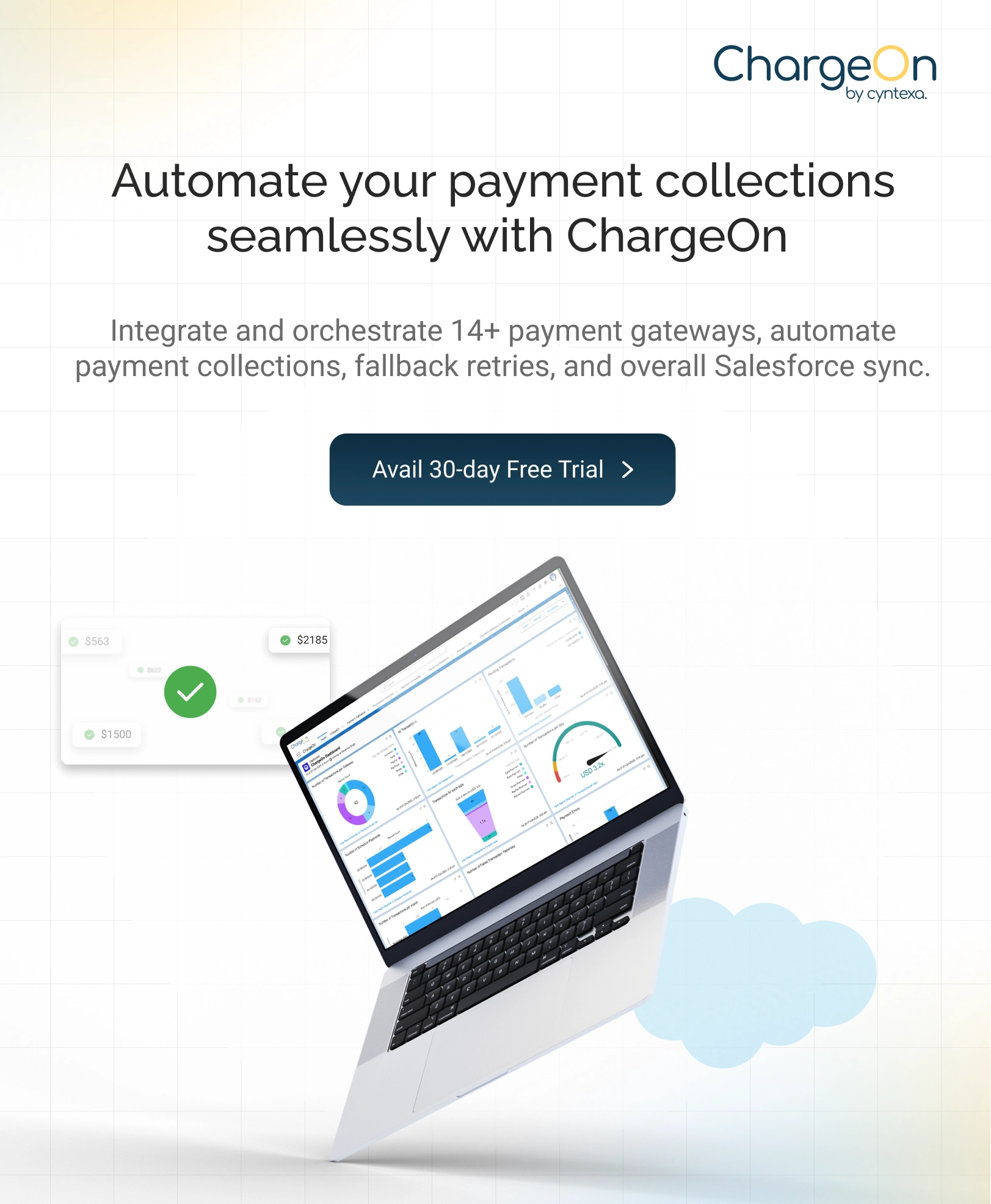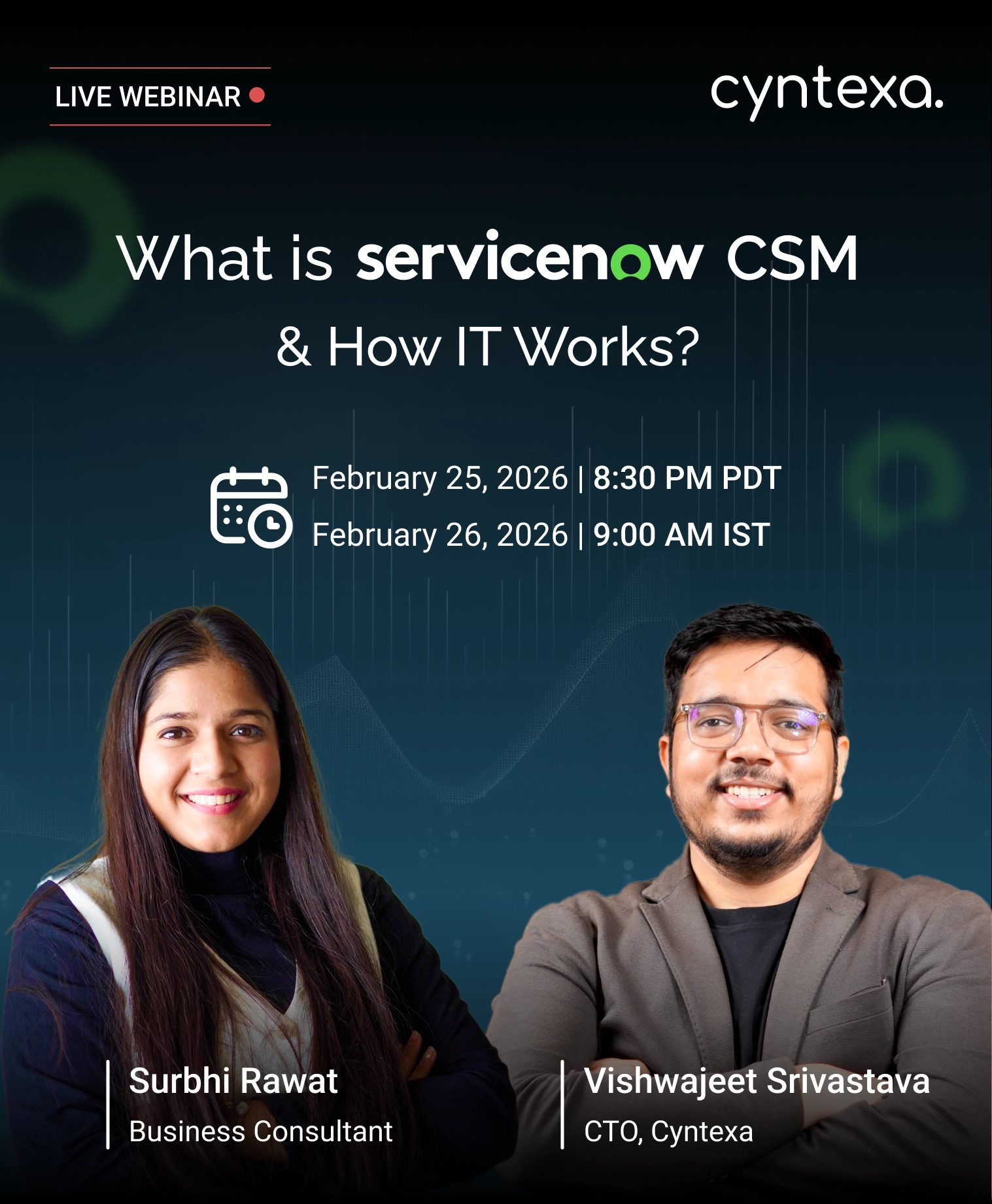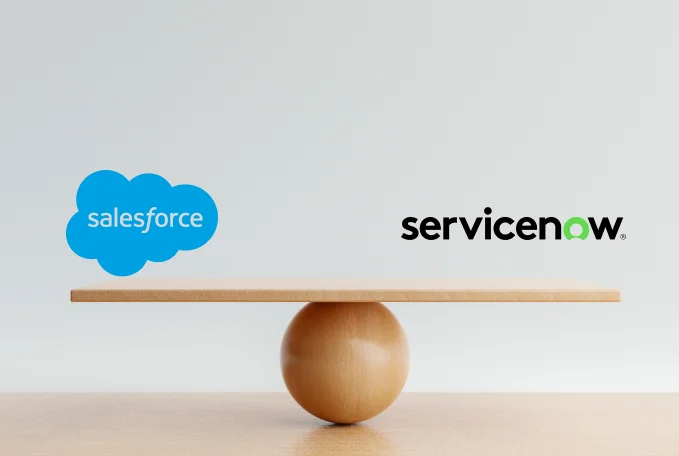Salesforce vs. ServiceNow: Which Platform is Right for You in 2025?
Table of Contents
Salesforce and ServiceNow are popular cloud platforms for businesses.
Salesforce, being the world’s leading CRM, helps businesses to manage their customer-side operations – managing relationships, sales, marketing, and more to ensure every customer has a delightful and personalized experience.
ServiceNow, on the other hand, helps businesses to seamlessly orchestrate internal processes, IT services, and the behind-the-scenes operations that keep businesses running.
For years, each has dominated its respective domain, serving globally from startups to 85-90% of the Fortune 500 companies. However, fast-forward to 2025, the clear line of difference between ServiceNow vs Salesforce (customer-facing vs. operations-facing) is getting blurred.
ServiceNow officially launched its AI-powered CRM, promising to be a unified platform for selling, fulfilling, and servicing customers to deliver exceptional experiences. Salesforce also announced its entry into the IT Service Management (ITSM) market, according to CEO Marc Benioff’s statement during Salesforce’s fiscal Q4 2025 earnings call.
This evolution creates both opportunities and complexities for businesses. You might find that one solution can handle both the customer and operational sides, which previously required two solutions. Or you might find that each platform’s core strength makes them best suited for different aspects of the business.
This comparison will break down what each platform does, where they overlap, and how to find out which platform serves your business’s needs best.
So, let’s get started.


Salesforce CRM vs. ServiceNow CRM: Where Do They Overlap?
Salesforce and ServiceNow, both platforms, now offer customer relationship management capabilities, creating direct feature parity in several key areas. Here, we have compiled a list of the core CRM areas where these platforms are delivering overlapping capabilities.
Customer Service Management
Salesforce and ServiceNow, both platforms, are offering AI-powered solutions to help businesses manage customer service.
Salesforce has a Service Cloud, and ServiceNow has a solution named Customer Service Management (CSM).
Service Cloud is a core Salesforce product built on the multi-tenant, cloud-based architecture. It is a complete platform for the service team, enabling them to engage with customers, manage processes, and offer services.
ServiceNow Customer Service Management (CSM) is built on the multi-instance ServiceNow AI Platform. It helps businesses to plan and coordinate activities between customers, support teams, and other teams to resolve customer queries more rapidly.
Here is a detailed overview of the Salesforce Service Cloud and ServiceNow Customer Service Management (CSM) capabilities that overlap with each other:
| Salesforce vs. ServiceNow: Customer Service Management | ||
|---|---|---|
| Features | Salesforce Service Cloud | ServiceNow Customer Service Management (CSM) |
| Self-service | You can create branded self-service portals directly in the CRM, either using the pre-built templates or drag-and-drop functionality supported by Experience Builder. These portals can also be deployed as an application for Android and iOS platforms with Mobile Publisher. Additionally, the integration with Agentforce for Service embeds natural language processing into the portals for contextual responses to users. | You can create personalized self-service portals for both customers and employees with a no- or low-code approach. These portals can be deployed on third-party web or mobile applications. Additionally, these portals can be integrated with Now Assist (ServiceNow’s Gen AI technology) and AI Agents to help customers get the support they need. |
| Case management | It has a Service Console, an easy-to-use single workspace for handling the entire case management process. Automatic case logging from web, email, mobile app, or any other channel. The case management process can be customized for support agents and customers, specifically for each organization. | CSM Configurable Workspace acts as a single panel for all the tools that service agents need to do their job efficiently, such as answering and resolving customer queries. The agents can work on multiple issues simultaneously. The customers can create a ticket through email, web, phone, chat, and more. The case forms can be modified to ensure the collection of the data needed by the organization. SLAs (Service Level Agreements) can be defined for both service agents and customers to ensure timely resolution and violation avoidance. |
| Omni-channel routing | Intelligent routing of the cases irrespective of the channel to qualified agents (based on skills, availability, etc.), queues, and Einstein Bots (AI-powered chatbots). | It uses Advanced Work Assignment (AWA) to route the customer queries captured from any channel to the right agent, contact center, middle, or back office. |
| Knowledge management | Allows you to surface the relevant knowledge articles in help centers to help customers find answers to low-touch inquiries on their own. The Service Console’s knowledge base gives support reps quick access to articles showing how similar cases were resolved before. Furthermore, the inclusion of generative AI ensures better contextually aware recommendations of solutions. | An AI-driven knowledge management system that helps support reps and customers with recommended solutions from the up-to-date knowledge base. The automated creation of knowledge base articles based on closed incidents. |
| Proactive incident management | Salesforce has native incident management capabilities built directly into the Service Cloud, enabling reps to track, diagnose, and resolve issues directly in the platform. It also offers integration capabilities with monitoring tools to improve proactive actions. Service Cloud can automatically create an incident and alert relevant teams to ensure timely resolution. | Similar to Service Cloud, it can also integrate with the monitoring tools and internal tools like ITOM, ITSM, and more for proactive issue identification. Cases can be created automatically or manually whenever an issue is detected and routed to the right agent. Workflow automation can also be set up to ensure rapid responses. |
| Robotic process automation | Allows the automation of repetitive tasks with no-code tools. | Its task intelligence capabilities enable the automation of the process of creating, prioritizing, and investigating issues. |
| Chatbots | It has Einstein bots that offer multilingual support to customers across the channel they prefer. | It has AI-powered conversational chatbots to solve customer queries with GenAI and automated resolutions. |
| Autonomous AI | Salesforce introduced pre-built AI agents called Agentforce. These agents can communicate with customers in natural language and solve their queries. | ServiceNow also introduced AI agents for CSM with the capabilities to understand the context, design step-by-step processes, and seek approvals from live agents whenever needed. |

Field Service Management
Salesforce has Field Service (formerly known as Field Service Lightning), and ServiceNow has Field Service Management (FSM) that helps businesses manage their field service experiences.
Salesforce Field Service is a unified platform that connects the workforce, products, and customers into one platform to streamline field service operations. ServiceNow FSM is also an integrated system of action that connects customers and employees to ensure an exceptional customer experience in the field.
Here is a quick comparison of Salesforce Field Service vs ServiceNow Field Service Management:
| Salesforce vs. ServiceNow: Field Service Management | ||
|---|---|---|
| Features | Salesforce Field Service | ServiceNow Field Service Management |
| Schedule work orders | Allow the scheduling of the work orders according to priority and constraints, complying with service level agreements. With AI, it can automatically assign the job to the best available agent. | It automates the process of work order scheduling by assigning the right resources based on factors like priorities, territory, and more. |
| Dispatch management | It has a Dispatch Console, where all the information related to resources is available, like absence, skills, availability, and more. | It has a single configurable workspace to simplify resource management and ensure seamless work distribution. |
| Field service territories | It has a concept called Service Territories to let you assign a territory to each field service agent. | It has a configurable interface to visualize, manage, and create territories. |
| Asset management | It is done through real-time asset tracking, including their usage, condition, and other specific criteria. | It has a single repository to track all the assets the field service agents utilize. |
| Visual remote assistant | With the virtual remote assistant, customers can connect with experts who can solve their problems on-screen, eliminating the need for an on-site visit. | It has a multilingual virtual agent to help customers find solutions to their problems on their own. |
| Mobile accessibility | It has a mobile application available for both Android and iOS. This app has offline capabilities, enabling field-service reps to work even during low or no internet connectivity. | It also has a mobile application with offline capabilities to help the sales team work from anywhere. |
| Generative AI | It leverages artificial intelligence to streamline operational tasks, including scheduling appointments, estimating project timelines, identifying required equipment and materials, and matching the most suitable technician to each assignment. AI is also used to help field agents with AI-powered work summarization and relevant knowledge articles to resolve customer issues. | It uses AI for surface-relevant knowledge base articles, helping technicians with current task activities, part recommendations, work duration estimations, and word order clustering to get the job done on the first visit. It also used AI for asset and equipment data analysis, knowledge base creation, training document creation, and work order generation. |
| Autonomous AI | Agentforce brings the convenience of automated scheduling, rescheduling, and appointment enquiries requiring no human agent involvement. Agentforce also helps field service dispatchers and mobile workers supercharge their efficiency. | ServiceNow Agentic AI can autonomously maintain workflows such as managing service requests, dispatch, and follow-up actions. |
→ Click here to download our free guide to Salesforce Field Service Lightning Implementation [Download Now].
→ Click here to download our free guide to ServiceNow Field Service Management [Download Now].
Sales & Order Management
Salesforce has Sales Cloud to manage sales operations and Order Management (OM) applications to help businesses manage the entire order lifecycle from capturing, fulfillment, shipping, payment processing, and service.
ServiceNow has a Sales and Order Management application that helps businesses optimize the lead-to-cash cycle on a unified platform.
Here we will compare the Salesforce Sales Cloud’s Order Management capabilities with ServiceNow Sales and Order Management to understand their overlapping capabilities:
| Salesforce vs. ServiceNow: Sales & Order Management | ||
|---|---|---|
| Features | Salesforce Sales Cloud and Order Management | ServiceNow Sales and Order Management |
| Sales cycle management | Facilitates the management of the sales cycle from tracking leads to deal closure from a unified platform. | From initiating a lead, tracking, and converting it into an opportunity to creating a sales agreement and automatically generating orders from quotes, it is a unified platform for all needs. |
| Pipeline management | Sales Cloud helps businesses with the visualization of the sales pipeline from lead capturing to closure. Beyond this, it lets you customize pipeline metrics and continuously track them to identify changes and take timely actions. | It also helps with the visual representation of the sales cycle from lead capturing to final closure. The sales cycle can be configured according to the different types of sales and their stages. It also supports effective monitoring to ensure timely actions are taken. |
| Lead management | Sales Cloud allows tracking, filtering, and lead scoring with the help of AI to enable sales agents to work on leads with high potential to convert. Additionally, it also has a feature called Buyer Assistant that automates lead qualifications that can be sent directly to a sales rep. | Its lead management capabilities include lead scoring and lead qualifications based on certain criteria specific to each organization. Additional capabilities include lead assignment to the right sales rep, lead segmentation, and nurturing. |
| Sales forecasting | Sales Cloud can forecast the pipeline by enabling the customization of KPIs to ensure accurate forecasting. Additionally, the real-time signals and historical data analysis improve the accuracy. | Enables sales forecasting based on the opportunities, historical data, and pipeline. |
| Contracts management | Sales Cloud assists sales reps from setting up contracts to their effective management. It tracks the approval process and uses workflows to send alerts, keeping reps informed about the approval and renewal of contracts. | It can capture the orders from customers and create or renew the contracts in response to the customers’ needs. |
| Pricing management | Salesforce CPQ (Configure Price Quote), a part of Sales Cloud, helps businesses implement dynamic pricing strategies that vary based on the conditions and actions specific to each customer. | It offers a configurable product catalogue, enabling dynamic pricing calculated based on the characteristics, attributes, and combination of the products/services. |
| Product configurator | An easy-to-use product configurator enables businesses to bundle different products or services. The sales reps can customize these bundles under the defined limits to meet precise customer needs. | Support the configurations of the bundle and complex products pricing. The product configurations can be validated using the defined rules. |
| Order management | Order Management has a unified console to access all the order-related information, ensuring easy tracking and management of the orders. The console can be modified using the custom tabs, fields, layouts, and components. | It has a configurable, extendable, and data-driven console to manage the order lifecycle from quote, order capture to fulfillment. The order management workflows it has are configurable and can be customized to meet specific business requirements. |
| Order fulfilment | It helps to streamline the process from order creation, assignment, packaging, picking, and shipping to ensure effective order fulfillment. | It has zero-touch automation capabilities for order orchestration and decomposition. Additionally, order hierarchy visualization keeps track of order fulfillment at each stage. |
ESG (Environmental, Social, & Governance) Management
Salesforce has a platform called Net Zero Cloud that helps businesses reduce carbon emissions. It unifies all the data related to carbon emissions into one platform, so you can easily measure and take necessary steps to reduce your carbon footprint.
Net Zero Cloud isn’t limited to ESG management; it is a comprehensive platform helping businesses achieve their sustainability goals.
ServiceNow has a product called ESG Management that creates a single source of action for all the data related to the environmental, social, and governance (ESG) programs of an organization.
Let’s have a quick comparison of Salesforce Net Zero Cloud vs ServiceNow ESG Management:
| Salesforce vs. ServiceNow: Environmental, Social, & Governance Management | ||
|---|---|---|
| Features | Salesforce Net Zero Cloud | ServiceNow ESG Management |
| Environmental metrics |
|
|
| Social metrics |
|
|
| Governance metrics |
|
|
| Generative AI | Einstein AI allows you to write a sustainability report by making use of the data stored in Net Zero Cloud. | Built on the ServiceNow AI Platform, ESG management can be easily integrated with Now Assist, a generative AI solution. |
| Integration capabilities | It can be easily integrated with the different products in the Salesforce ecosystem, like Experience Cloud, Field, Service Lightning, and more. Additionally, it also supports third-party integration. | It can be seamlessly integrated with other ServiceNow products such as Strategic Portfolio Management and Risk Management. It also supports third-party integrations to have a centralized ESG command center. |
HR Services Management
Salesforce has an employee service module in the Service Cloud called HR Service Management. It leverages the Service Cloud’s core capabilities, such as case management (track, manage, and resolve employee requests), omnichannel support, knowledge base, and more.
On the other hand, ServiceNow HR Service Delivery (HRSD) is a purpose-built application to streamline, automate, and modernize HR service delivery from employee onboarding to retirement.
Here is an overview of the overlapping capabilities of Salesforce HR Service Management with ServiceNow HR Service Delivery Management (HRSD).
| Salesforce vs. ServiceNow: HR Service Management | ||
|---|---|---|
| Features | Salesforce HR Service Management | ServiceNow HR Service Delivery |
| Self-service portals | An employee portal can be set up that surfaces the relevant content recommendations and best course of action, powered by AI, to help employees resolve issues. | Enable the configuration of self-service portals powered by AI-driven research, enabling employees to find relevant answers. |
| Case management | It has the HR Service Console, a centralized workspace for HR teams to manage support cases and employee requests. It also facilitates the automated routing of employee requests to the right team members. | It also has a centralized HR workspace for managing all employee requests conveniently. This workspace also has reports and dashboards to help HR measure the effectiveness of their services. |
| Assistive AI | It leverages AI for case summarizations, building knowledge base articles from conversations to eliminate mundane HR tasks. Beyond this, AI can also help in historical data analysis to gain insights from it. | It has GenAI, a GenAI-powered virtual assistant that helps provide contextually aware self-service to employees. Beyond these, it can be used for automating mundane tasks, knowledge base creation, historical data analytics, and more. |
| Autonomous AI | Salesforce introduced Agentforce for HR, a fully automated AI agent to support employees’ focused tasks. These agents can autonomously execute the HR tasks. | Its autonomous AI capabilities beyond submitting HR requests and resolving queries can help automate multiple processes, such as:
|
Salesforce HR Service Management is just an extension of Service Cloud; therefore, it has limited capabilities to offer. However, as said, ServiceNow HRSD is a purpose-built solution that has a suite of applications helping businesses manage their HR operations more efficiently. The capabilities compared above are the ones that overlap with each other. Whereas ServiceNow HRSD has several other capabilities to offer.
Customization
Salesforce CRM offers a wide range of customization options and low-code development tools to help businesses align the platform with their needs. Beyond changing the user interface and improving default features and modules, it also allows the development of the out-of-the-box components specific to an organization. This flexibility matters when standard features aren’t enough. If you’re planning to extend Salesforce with custom development to fit unique requirements, working with the right team can help you get there.
Salesforce also allows code-level modifications to alter even the Salesforce environment. You can also develop the plugins, middleware, or connectors to ensure the data exchange with third-party systems.
ServiceNow also offers customization options. It’s a Service Portal that enables the creation of self-service portals that are customized to suit the specific needs of an enterprise. Workflow customization allows you to automate the processes according to business objectives. It also allows the modification of baseline business rules, building complex integrations, and more.
Assistive AI
Salesforce and ServiceNow have been at the forefront of the industry in AI adoption, empowering their customers to evolve their business practices.
Salesforce revolutionized CRM accessibility in 2016 with the introduction of Einstein, a unified, platform-wide AI offering that brought artificial intelligence to all CRM functions—sales, service, marketing, and more.
Salesforce Einstein was powered by advanced technologies such as deep learning, predictive analytics, machine learning, and NLP (Natural Language Processing).
Fast forward to September 2023, when Salesforce introduced Einstein Copilot (later rebranded to Agentforce), a generative AI-powered conversational assistant available across every CRM function. Since then, Salesforce has evolved with its suite of AI applications powered by assistive AI capabilities.
In 2025, Salesforce Einstein Platform is bringing the assistive AI capabilities through a conversational interface and is embedded into the workflows such as sales, customer services, marketing, commerce, and more. These capabilities are helping businesses to automate manual processes and generate proactive recommendations to improve customer relationships.
ServiceNow’s Now Intelligence, introduced in 2020, brought AI capabilities to the entire platform using Natural Language Processing (NLP), predictive intelligence, and performance analytics. The Now Assist, introduced in September 2023, brought the assistive AI capabilities to the platform. Since then, it has evolved and been deeply integrated across all ServiceNow products, such as ITSM, ITOM, CSM, HRSD, and more.
In summary, both Salesforce and ServiceNow are proactive players in realizing AI’s potential and adapting it to shape their capabilities for better customer service. However, these capabilities were previously more focused on their respective core areas. Salesforce worked to improve customer-facing operations with AI, while ServiceNow focused on improving organizations’ internal business processes. Now, as these players are expanding into each other’s territories with their offerings, their assistive AI capabilities are expected to become more directly comparable.
Autonomous AI agents
Autonomous AI agents are helping both platforms expand their offerings beyond traditional copilots and chatbots. Salesforce with Agentforce offers a suite of autonomous, proactive AI agents designed to execute specialized role-based tasks across sales, customer services, marketing, commerce, and more.
ServiceNow also integrated the AI agents into every business process, including but not limited to ITSM, customer service, and HR.
Both platforms are evolving rapidly and rigorously working on capitalizing on the thriving ecosystem by making an impact that brings value to businesses.
Here we have compiled an overview of the overlapping capabilities of the Salesforce Agentforce and ServiceNow AI agents.
| Salesforce vs. ServiceNow: Autonomous AI Agents | ||
|---|---|---|
| Features | Salesforce Agentforce | ServiceNow AI agents |
| Low-code development | It has Agent Builder, a no-code platform enabling the development and customization of agents based on natural language instructions. | It has AI Agent Studio, a development platform to create and customize AI agents using natural language instructions. |
| Data access | It has built-in access to all the CRM data and can additionally be integrated with external sources through Data Cloud. | It has a Workflow Data Fabric that connects all the data on one unified platform from both internal and external sources. |
| Agent guardrails | It allows the users to specify the guardrails in conversational language that will work with Einstein Trust Layer to control AI agents’ behavior. | It also supports custom agent guardrails that are supplemented by ServiceNow’s security and governance model. |
| Supported deployment channels |
|
|
| Monitor, measure, and optimize AI agents | It has Agentforce Command Center, a unified tool that facilitates live health monitoring and performance measurement. | It has an AI Agent Control Tower that helps to manage, monitor, and optimize AI agents. |
In summary, both platforms have autonomous AI capabilities that have overlapping capabilities and benefits for business.
ServiceNow vs. Salesforce: What Are the Differences?
Architecture: Multi-tenant vs Multi-instance
Salesforce platform is built on a multi-tenant, metadata-driven architecture. Put simply, multiple tenants (an organization using Salesforce) share a single Salesforce instance, but each maintains a completely isolated and secure environment that keeps their data fully protected from other users. Driven by metadata, each instance can be customized to meet specific needs without altering the baseline coding.
ServiceNow is built on the multi-instance architecture. Simply put, each organization user has their dedicated instance, fully isolated from other instances, emphasizing data privacy and security. All these instances are centrally managed by ServiceNow to ensure timely upgrades, backups, and security posture. Since each instance is isolated, customization can be made without affecting the other instances.
System of Record vs System of Action
The system of record (SOR) refers to the platform that can be used to store and manage the data; human intervention is a must to act upon the data.
The system of action (SOA) refers to the platform that, beyond storing and managing data, can initiate real-time actions, automate workflows, process data, or more.
Salesforce primarily acts as a system of record. It is designed to be a single source of truth for storing and accessing all the customers’ data, unconnected across multiple systems. Businesses can understand the customer data and take targeted action to strengthen relationships (manual intervention is needed to drive insights into actionable strategies) through personalized experiences.
Salesforce is rapidly evolving into a hybrid platform, acting as both an SOR and SOA platform by enriching its automation and action-oriented capabilities. Automation tools like Salesforce Flow, its AI (Einstein AI), and digital labour (Agentforce) are facilitating automated and even fully autonomous actions across business processes.
Contrary to Salesforce, ServiceNow is designed as a system of action platform that automates workflows and manages processes. While it can store the data, its primary focus is on workflow automation. Now, the introduction of its CRM capabilities enables it to centralize all the customer-related information, making it a reliable system of record for customer information.
In summary, they both serve the dual purpose of both SOA and SOR platforms; however, their primary focus sets the difference between them apart.


Salesforce vs. ServiceNow: Which Platform to Choose?
The selection between Salesforce vs. ServiceNow seems to be a complex choice. However, this decision can be simplified with granular attention to business requirements.
For example, Salesforce hasn’t introduced any ITSM or other capabilities so far that help businesses manage their internal processes. Its core expertise still lies in helping outward-facing departments of an organization to do their job effectively. Thus, ServiceNow is a choice of platform if your business need is to ensure optimal working of internal business processes.
However, if you are looking for a CRM solution, then both platforms can serve your needs better. Salesforce is a comprehensive CRM that helps businesses manage their customer relationships beyond sales, service, and marketing. Its comprehensive offering positions itself as the most preferred solution if you need a full-fledged solution for customer relationship management. Additionally, Salesforce has a range of purpose-built solutions for industries – healthcare, finance, retail, manufacturing, and more—enabling it to better serve industry-specific needs.
ServiceNow evolved as a CRM platform, but its offerings (CSM, FSM, & Sales and Order Management) are limited when compared to Salesforce. If you need a CRM that can streamline your customer service, sales, and order management, then ServiceNow can be considered a preferred solution.
In summary, both platforms can serve customers of all sizes, and their selection criteria are defined by their core expertise. Additionally, these platforms can also be integrated, helping organizations to leverage the best of both. At Cyntexa, we have a team of Salesforce and ServiceNow consultants helping businesses to make the selection between these two platforms. We work with you to understand your business processes and long-term vision to align you with the right platform. Beyond this, we can help you to integrate both of these platforms to package their core capabilities tailored to your organization’s needs.
Don’t Worry, We Got You Covered!
Get The Expert curated eGuide straight to your inbox and get going with the Salesforce Excellence.
AUTHOR
Vishwajeet Srivastava
Salesforce Data Cloud, AI Products, ServiceNow, Product Engineering
Co-founder and CTO at Cyntexa also known as “VJ”. With 10+ years of experience and 22+ Salesforce certifications, he’s a seasoned expert in Salesforce Data Cloud & AI Products, Product Engineering, AWS, Google Cloud Platform, ServiceNow, and Managed Services. Known for blending strategic thinking with hands-on expertise, VJ is passionate about building scalable solutions that drive innovation, operational efficiency, and enterprise-wide transformation.


Cyntexa.
Join Our Newsletter. Get Your Daily Dose Of Search Know-How
Frequently Asked Questions
Salesforce has different pricing plans catering to the needs of businesses of all sizes. For example, it has a Starter Plan starting from $24/user/month for small businesses, while it also has plans priced as high as $500 for meeting complex business needs. ServiceNow, on the other hand, works on a custom quotation system where the price is determined based on the needs of the business.
Salesforce and ServiceNow are both cloud-based platforms that can scale to support your business growth. Salesforce operates on a per-user basis, so when your business grows, all you need is to purchase more user licenses to meet growing demand.ServiceNow is based on a multi-instance architecture, allowing each business to have its own database and application nodes. This allows the platform to scale efficiently to meet each business's growing needs.
Salesforce has different types of customer support available based on license type. It allows customers to connect through phone or live chat. Furthermore, it has a self-service portal, knowledge base, and other resources to help customers find answers to their questions. ServiceNow offers 24*7 customer support through the Now Support portal. Furthermore, it also has self-service resources, articles, tutorials, etc., to help customers.









